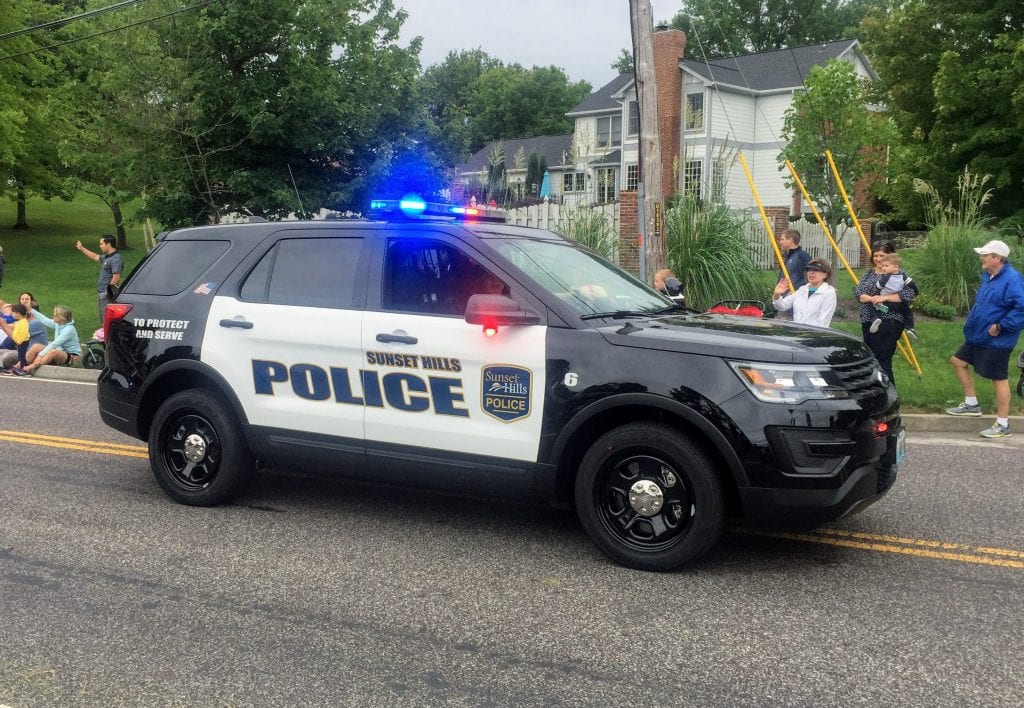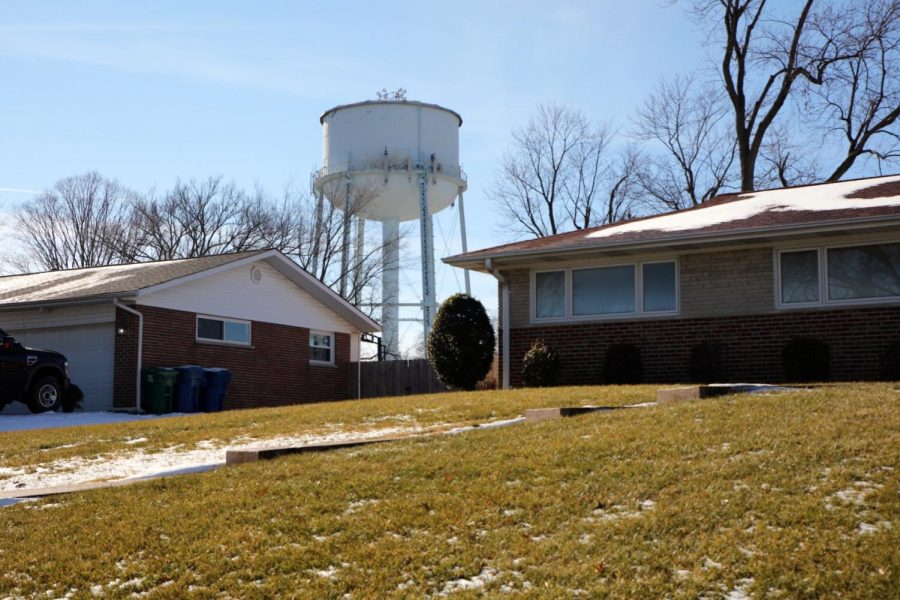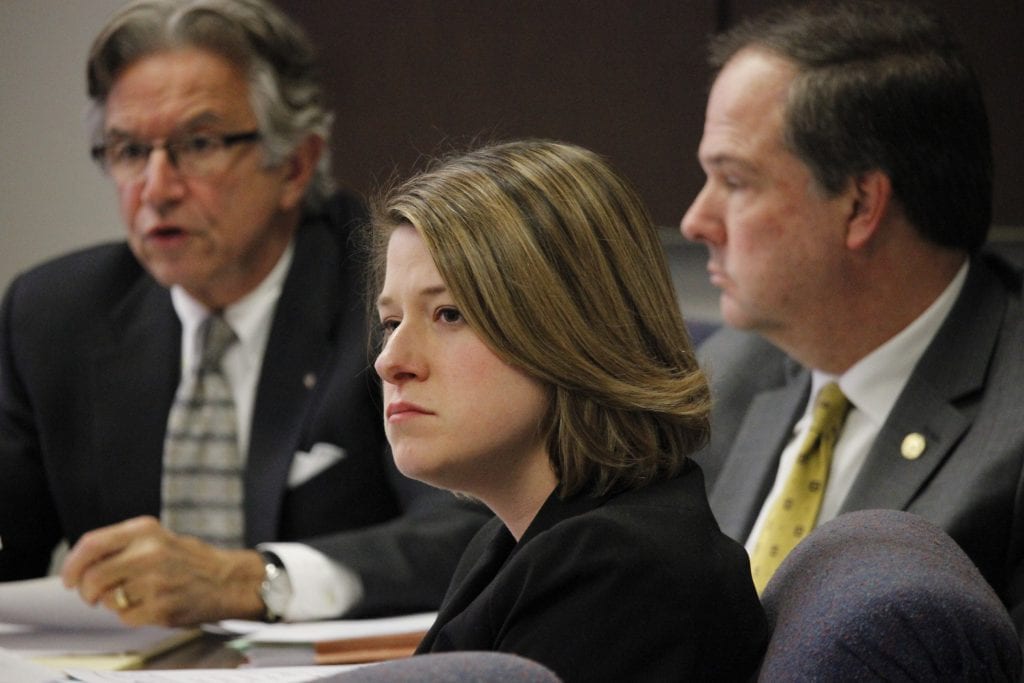Sunset Hills is considering increasing salaries for the city’s Police Department and guaranteeing raises over time with a new pay matrix.
Under the proposal, police pay would increase with a new pay matrix for both police officers and sergeants starting July 1. The raises would be funded by a roughly $150,000 annual agreement between Sunset Hills and Crestwood for the Sunset Hills Police Department to provide 911 dispatching for the Crestwood Police Department, also starting July 1.
The Board of Aldermen will consider the pay matrix when it next meets at 6 p.m. Tuesday, June 8, in a videoconferenced meeting. As the St. Louis County Police Department raised police wages through the countywide sales tax Proposition P, other county police departments have also had to raise salaries to compete. The county has more than 50 police departments.
“Since July of last year, we’ve lost five officers to different departments within the area. Four of them during their exit interviews said pay was a primary reason,” said Sunset Hills Police Chief Stephen Dodge at the May 13 Board of Aldermen meeting. “A lot of these other departments, besides having higher pay, they also have a defined pay matrix. And what that means is every year over a certain amount of years, you would get a step increase, so you know from year to year to year exactly what your salary was going to be.”
The current entry-level salary for patrol officers is between $55,000-$56,000 and tops out around $73,000, Dodge said. The funds from the dispatching pact should cover the pay raises and then some.
If aldermen agree to the new matrix, the compensation schedule for patrol officers would start at $59,208 and top out at $77,253 after 10 “steps.” Sergeants would start at $70,821 and max out at $92,405. All patrol officers and sergeants would move up to their eligible step starting July 1. From there, officers and sergeants would move to the next step Jan. 1 of each year. New hires would not be eligible for a step increase for at least six months. The steps each year represent a 3-percent raise.
Some of the department’s officers have left for Ladue, which maxes out around $82,000 after five years, and neighboring Kirkwood, which maxes out around $78,000-$79,000 after seven years. Longtime Sunset Hills City Clerk Laura Rider, who worked closely with the Sunset Hills Police Department for many years, has been the assistant to the mayor/city clerk in Ladue since 2015.
“It’s gotten pretty competitive. I can also tell you that the applications are way down. And that’s not just for Sunset Hills, but that’s for the whole area. A lot of these high-pay departments have multiple openings right now and will .. in the future,” said Dodge. “To retain the best and recruit the best, we have to be competitive in our pay scale. So I think this … pay matrix — although it’s not among the very best — it makes us competitive and will help us retain and recruit.”
Epperson hopes to earmark funds
The proposal was recommended by the Finance Committee in April and the Police Advisory Board earlier in May.
Ward 3 Alderman Randy Epperson, who was a member of the police board as a civilian prior to his election, made a motion at the May aldermen meeting to add an amendment to the dispatching contract’s ordinance that would automatically earmark the dispatching revenue for the Sunset Hills police so it couldn’t be used for anything else. He referenced Proposition P, a half-cent sales tax that St. Louis County voters approved in April 2017 to fund police and public safety.
“The chief went out and got this deal and the spirit behind it is to fund … the new pay matrix for the Police Department, and it’s going to fully fund that from what we can tell. … The spirit of my motion is to dedicate the funds to the police department,” Epperson said. “Anyone (who) has watched Prop P get destroyed by governments knows what I’m talking about.”
But Ward 2 Alderman Casey Wong cautioned against the “windfall fallacy,” adding that he did not think it was fair that funds be earmarked for police when other departments do not have the same luxury.
“The windfall fallacy and bias is that you get money in and you spend it looser than you do a general fund. That’s why basic budgetary business 101, even when you get extra money … you spend it like you would your normal budget,” said Wong. “To say that hey, we’re getting this money, therefore we can dedicate it or earmark it for something else — I understand the principle behind it and it seems to superficially make sense, but budgetwise … it’s not good financial sense.”
Wong suggested holding off on the contract until June to give aldermen more time to review Epperson’s amendment.
“Fundamentally, it’s unfair to other departments. … If Chief Dodge needs something for his team, he just makes the request. … (Otherwise) it’s fundamentally unfair to the checks and balances and to the other directors and their teams,” said Wong. “We can make a motion to amend when they are minor and germane. I’m not sure that’s this. This has nothing do with the dispatch services agreement … (I object) to a second reading because we might want to put the brakes on it.”
Mayor Pat Fribis suggested that a resolution be discussed in June that could direct where dispatching revenue goes before the contract goes into effect in July, but that for the time being, aldermen should weigh the contract without the amendment. Epperson withdrew his motion.
“That actually makes sense. … In order to survive an audit and generally, accounting principles, we have to identify the expenditures that these particular funds are going to be used for and Alderman Epperson’s motion doesn’t really set forth what that is,” said City Attorney Robert E. Jones. “In general, yes — the police. But whether it’s benefit enhancements, whether it’s salary increases, capital expenditures, body cameras, we probably could be a little bit more thoughtful.”
Sunset Hills does not vote on first readings, but Ward 2 Alderman Christine Lieber motioned to suspend the rules for final passage. Suspending the rules requires a unanimous vote of the board.
Wong, Ward 1 Alderman Ann McMunn and Ward 3 Alderman Cathy Friedmann voted against a second reading, while Lieber, Ward 1 Alderman Joe Stewart, Epperson and Ward 4 Aldermen Thompson Price and Fred Daues voted in favor.
Wong wondered if a bonus might make more sense to attract talent, but Jones said that state law doesn’t permit the city to give bonuses for work already done. Wong clarified that he meant sign-on bonuses.
“(Hiring bonuses) sounds really attractive but it’s also been proven to be counterproductive because it’s short-lived, because human beings have a short memory. … A pay matrix is an even playing field, pax matrixes are also common in any form of government employment,” said Epperson, who sits on the police board. “We had these discussions six years ago and it was supposed to be implemented then. … Rest assured we’re not in the top 10 percent, and we don’t want to be in the lower percentile.”
































